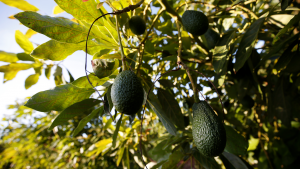Avocados, 100 Days of Protest, and Pineapple Politics

Catch the week's top news and research in food, agriculture, and global development in our Global Food for Thought news brief.
Top Story
100 Days of Protests
Saturday marks the 100th day of farmers’ protest in India. Tens of thousands have been camped outside the nation’s capital since December to demand the repeal of three agricultural reform laws. While the government maintains that the bills will modernize India’s agricultural sector, many farmers fear that they will be left vulnerable to large agribusinesses. The protests recently gained widespread international attention from celebrities and activists. Many experts wonder how the protracted movement will impact Modi’s political power.
Council Insights
DC, Delivered: In the first weeks of his presidency, Biden rolled out a historic number of wide-reaching executive orders, including a renewed focus on climate change. The first post in our new blog series, Delivery from the District, explores how integrating a climate lens into foreign policy and national security will have ripple effects on both domestic and global food security.
Food & Agriculture
Blame the Avocados: Pesticides fueling a boom in commercial avocado and citrus in Colombia may be responsible for killing of hundreds of beehives in recent years. Investigations have specifically pointed to fipronil, an insecticide used on crops to control for ants and ticks, that has been banned in Europe and restricted in the US and China.
See also: Avocados vs. Elephants
Missing Fish: Africa’s largest fish producer, Nigeria, is facing a 2.5 million metric ton fish deficit. This magnitude of a deficit may have impacts on the protein intake of Nigerians as COVID-19 supply chain disruptions continue. This marks an opportunity for investment in large scale fish production in Nigeria.
Pineapple Problems: China banned pineapples from Taiwan, citing concerns of “harmful creatures” that could enter with the fruit. Taiwan’s leaders have alleged political motives for the ban, which represents a loss of the market for 90 percent of the island’s pineapples.
Deeper Dive
How many avocados does the world eat? Over 7 million metric tons of avocados were produced in 2019. Hass avocados are the most popular variety of avocado globally and make up 95 percent of US consumption, which has tripled since 2000. The US, Canada, Japan Spain, and the Netherlands are top importers of the fruit, but the US imports the vast majority—77 percent. North American dominance extends to exports as well, with Mexico leading far and above all others.

Avocados grow on a large-scale farm.
Data Crunch
Tracing Waste: The UNEP, in collaboration with a UK charity, has released the world’s first food waste index. According to the accompanying report, 17 percent of food available to consumers in 2019 was wasted and that waste in high- and low-income countries is not dramatically different. The vast majority of waste occurred at the household level.
Resilience
Harvests Drop in Sudan: A new assessment by the International Committee of the Red Cross has revealed that food production has drastically declined in South Sudan as a result of climate shocks, and conflict and violence. In nine out of ten states, communities harvested on average 50 percent less cereal and vegetables in 2020 than they did in 2019.
Big Ideas
Roles Evolving: A recent assessment of NEPAD’s Agricultural Technical and Vocational Education Training for Women Program (ATVET4Women) in Malawi finds that social norms regarding the role of women in farming are changing. More families believe that the success of farming and business relies on the participation of both the husband and the wife. It also finds that a lack of autonomy in income and work balance are the main contributors of disempowerment among women and men.
DC Report
Spring Cleaning for Climate Change: Senior House Energy and Commerce Committee members introduced a bill laying out their plan to tackle climate change. It would establish the Clean Energy and Sustainability Accelerator to mobilize public and private investments in clean energy technologies, prioritizing communities such as agricultural economies who are most adversely affected by climate change. The technologies would address energy use at all levels from production to transportation, paving the way for the agricultural sector and others to become more sustainable.
Big Actors
FAO Fighting Famine: FAO has appealed for $90 million in funds to assist over 6.3 million Yeminis with emergency livelihoods assistance to prevent a large-scale famine in the country. FAO is working with farmers to help them recover from locust attacks, in addition to providing support for dairy production, and rehabilitation of water systems and infrastructure in Yemen.
See also: Hunger is the Deadliest Weapon of War
Trade & Commodities
Opinion-Dominance No More: The US no longer has clear export dominance of grains in the world market. The US exports just around a quarter of the world market’s soy, corn, and wheat. 30 years ago, that that figure was more than half. Despite producing just as much grain products as ever the US has a significantly smaller market share.
Events
Strengthening the Transatlantic Cooperation for Research and Innovation in the Agri-Food System
Date: March 18
Time: 4:30 p.m. CET

